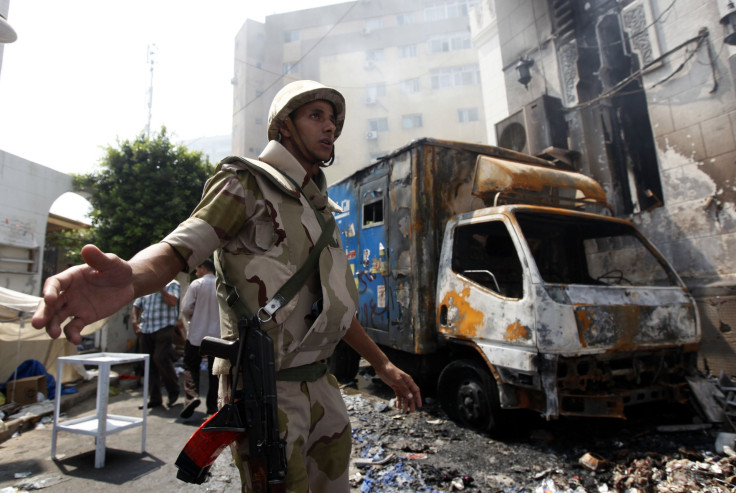In Egypt, Bloodshed Between Government Forces And Morsi Supporters Has Taken The Lives Of Hundreds

At least 421 people were killed and 3,572 injured in fighting in Egypt -- in Cairo, Alexandria and other towns and cities -- on Wednesday as authorities clamped down on individuals protesting President Mohamed Morsi's ouster, Reuters reported. The government declared a state of emergency and braced for more protests.
Clashes spread like wildfire in the mostly Muslim nation of 84 million, and the crackdown defied appeals in the West for peaceful negotiations. Overall, Egypt hasn't experienced this level of bloodshed in decades.
The violence lingered into Thursday morning, when state TV reported that backers of Morsi, who hasn't been seen in public since being taken into custody, attacked police stations, government buildings and hospitals even though the government had mandated a curfew, CNN reported.
"It's an open war," a protester who escaped one of two Cairo camps that were raided told CNN. The unrest was prompting the closure of banks and the Egyptian stock market.
As security forces struggled to contain the chaos, Islamists battled with police and military personnel during two Cairo sit-ins, which had become key meeting places for Muslim Brotherhood resistance to the ruling military forces, Reuters reported.
The Egyptian Health Ministry said Thursday that the death toll has risen to 421 and the number of injured was 3,572.
Meanwhile, despite the shocking death toll and overall level of mass chaos in the country, Prime Minister Hazem Elbeblawi, a Nobel Prize winner, pledged that "we hopefully will rebuild our nation."
"I think what we're seeing right now is just the beginning of what is promising to be a very, very long and bloody battle as the interim government and the security forces try to regain control of the streets," CNN's Arwa Damon said from Cairo.
On Wednesday, according to state TV, Egypt's government issued a month-long state of emergency. The prime minister said the government was aiming to ensure stability, CNN said.
"We are here to build a democracy based on justice," Elbeblawi said. "... We have to reason and use common sense. We are all part of this nation."
Still, not all Egyptian leaders expressed that sort of optimistic camaraderie.
Mohammed ElBaradei, who was one of Morsi's biggest critics, resigned Wednesday as vice president of foreign affair. He said he disagreed with decisions being acted upon by the ruling government and that he "cannot be responsible for a single [drop of] blood."
Kenneth Roth, executive director of Human Rights Watch, blasted the "ongoing violence" by Brotherhood supporters against Coptic Christian churches in the country. But he did also harshly criticize the government's crackdown on the Islamist group.
"Didn't have to happen," Roth tweeted. "MB had right to protest. No need for massive lethal force."
Wednesday's violence, which followed a series of government threats, has ended up being the third mass killing of Islamist demonstrators since Morsi was ousted six weeks ago, according to the New York Times reported.
However, the Times added, the scale of the sitution -- it's lasted more than 12 hours -- and it's ferocious nature -- with the prolific use of armored vehicles, teargas, birshot, live firepower, bulldozers and even snipers -- has greatly exceeded the Egyptian Interior Ministry’s promises of a gradual and measured dispersal, the newspaper said.
As the Times pointed out, at least one protester was incinerated in his tent, and many others were shot in the head or chest. Some of the shooting victims were people who seemed to be teenagers, including the 17-year-old daughter of Mohamed el-Beltagy, a prominent Islamist leader. At one point early Wednesday, within 15 minutes, the number of dead bodies brought to a makeshift morgue in a field hospital, went from three to 12, the Times detailed.
There, the Times added, a medic could be heard calling out “Martyrs, this way” while directing the men who were bringing in new stretchers.
© Copyright IBTimes 2024. All rights reserved.











